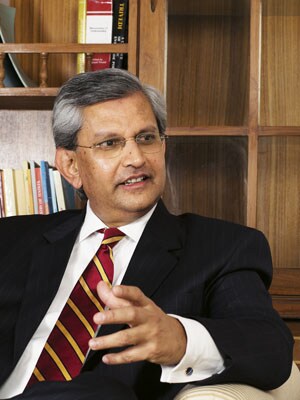
Ranking Our Netas
For the first time in India, citizens will be able to track ministries’ progress reports online. And Prajapati Trivedi has the job of putting the system in place
PRAJAPATI TRIVEDI
The Mission Secretary, performance management. To set up a transparent and objective performance appraisal system for the various ministries.
The Difference He Makes He comes with rich experience. His World Bank stint took him to places as diverse as Kenya, Riyadh and Gaza — he has worked with 26 governments across the world. That gives him the ability to tap into some of the best practices in different parts of the world.
Key Insight “At the end of the entire exercise,
we can name and shame, say the top 10 ministries and bottom 10 ministries, unleashing a competitive zeal inside the government. ”
After doing everything else, this was the ideal job. The job was so compelling. I got this opportunity to close the implementation gap in the government. With my World Bank experience and my global networks, I also had this ability to tap into some of the best practices in different parts of the world. It’s well established that the big difference between the developed country and developing ones is not so much about strategising and planning but implementation. I had been writing a lot to the Indian government, made proposals wanting to work here. I was helping other governments and I wanted to do it for India.
On January 2, 2009, I got a call from the cabinet secretary if I would like to join. A reluctant World Bank was advising me to wait for the elections to get over before taking the plunge. I told them I shouldn’t be thinking about election results if I was serious about what I wanted to do. I was coming here for the country, not for the government and that’s the reason why my post was made a bureaucratic assignment.
So who vets the performance against targets at the end of the year? Instead of government doing it, we have formed an independent, non-government task force of 15-20 people as knowledge partners. They are a set of IIM professors, ex-secretaries. The key to success was having a large competent and independent group of experts. They went through training.
What am I doing?
For the first time, the government department will have an elaborate procedure for setting priorities, defining performance and deliverables and then each of them will be judged according to how they perform by an independent committee comprising IIM professors and ex-bureaucrats. It has begun with the ministries but soon it will trickle down to cover bureaucrats as well.
The first stage of this system is to prepare a Results Framework document (RFD). The 12-page document provides a summary of the most important results that a department/ministry is expected to achieve during the financial year. This document has two main purposes: Move the focus of the department from process orientation to results orientation and provide an objective and fair basis to evaluate the department’s overall performance.
The document is prepared with internal consultations within specific ministries, aligned with government’s annual and five-yearly plans and is vetted and approved by a high power committee on government performance led by the cabinet secretary. Once it gets finalised [it] becomes a contract document against which each ministry and department’s performance will be judged at the end of the year.





